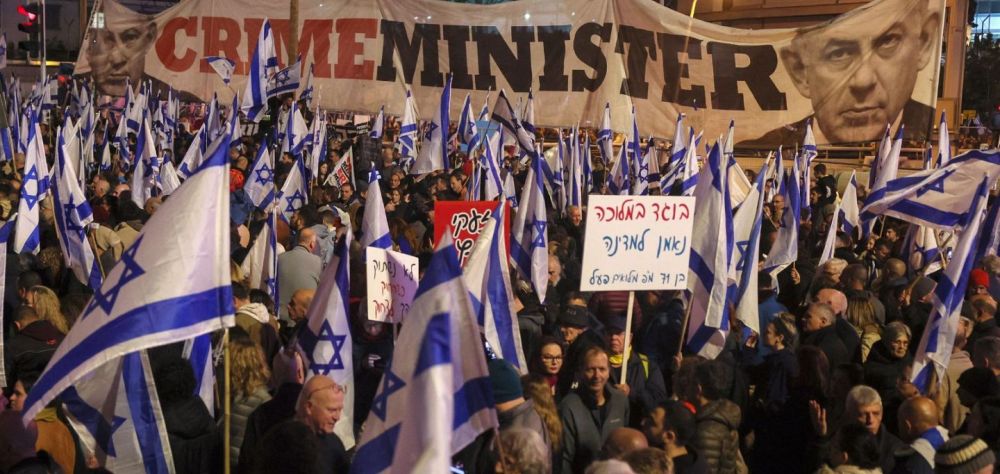The Hebrew-language Kan news network reported that tens of thousands took to the streets protesting against Netanyahu government. Weekly demonstrations against Netanyahu, which are organized every Saturday night, were held for the fifth consecutive week in the cities of Tel Aviv, Haifa and Beersheba in the south of the occupied territories. According to Israeli media, more than 13,000 protesters participated in Haifa protests alone. Also, more than 6,000 gathered in the main square of the city of Herzliya. Tens of thousands of people also gathered in Tel Aviv. According to the Hebrew-language media, about 15,000 people were present in the demonstrations, something showing that several weeks after these protests, the number of protesters has not only not decreased, but also set to increase relatively.
According to reports, as masses took to streets, police forces blocked some squares and main streets to prevent more protesters from joining in. The protesters demand Netanyahu’s resignation because he was accused of corruption in several cases. The protesters described the Israeli regime as moving on the path of tyranny and dictatorship and demanded an end to the hard-line government’s programs. They also chanted slogans against the judicial reforms proposed by Netanyahu’s cabinet. Israel’s N12 TV released a poll result on Saturday showing that 62 percent of Israelis want the proposed judicial plans to be withdrawn.
The judicial reforms faced massive opposition after they were put forward by Justice Minister Yariv Levin. So far, several demonstrations were held in Tel Aviv to their opposition. The purpose of this plan is to give the government full control over the appointment of judges, including the head of the Supreme Court, and severely limit the power of this court to overturn laws and enable the Knesset to re-enact laws that the court overturned with only a 61-vote majority.
Opposition protests, led by former officials including Yair Lapid and Benny Gantz, first started on January 24 and are held weekly on Saturdays. These massive protests are unprecedented in the history of the Israeli regime, and they seem to be part of the factors the Israeli President Isaac Herzog repeatedly warned would lead to Israeli collapse from within. In the first week of protests, more than 90,000 Israelis were present in important cities including Haifa, Tel Aviv, Al-Quds (Jerusalem) and voiced their strong opposition to judicial reforms. In the second week of protests on January 21, the opposition turnout was substantial and according to Israeli media and analysts, nearly 150,000 people participated.
The number of protesters has fluctuated between 90,000 and 150,000 in recent weeks, and former Tel Aviv officials have said they will continue to protest until Netanyahu’s hard-line cabinet backs off from its controversial judicial policies.
Choosing Saturday for protests is interesting in its own way. According to historical and religious traditions, Saturday is holy for Jews and is a holiday, but the opposition, like their predecessors who violated the rules of Saturday in the past, have taken the same procedure to show that they are opposed to the controversial government plans and are determined to push the government back.
Danger of collapse haunting Netanyahu
The continuation of the protests and their expansion week by week is a danger haunting the fledgling cabinet of Netanyahu and can end it even sooner than its standard term time.
In addition to the street protests, the strike campaign is increasing day by day, and if it widens in the next weeks, it can paralyze the Israeli economy and sink the government. Even currently, the economic situation is inappropriate and gets even worse with the start of strikes. For this purpose, the organizers of the demonstrations called for a nationwide strike and protests again on Monday. More than 50 high-tech industrial companies have announced the participation of their staff in strike and protest.
According to reports, these tech companies demonstrated just outside the Knesset in the occupied Al-Quds as on Monday the Ministerial Constitutional Committee convened to look into the proposed reforms.
TLV Partners Fund, a venture capital, said that it provides free buses for the demonstrators. Lemonade, a New York-based Israeli online insurer, said that it allows its staff to strike and provides transportation to them.
Given the fact that the worker strikes are accompanied by massive protests, they can considerably help the opposition leaders to realize their goal of taking Netanyahu government down. The far-right parties joined Netanyahu coalition under the condition that they be allowed to implement controversial programs, on top of them judicial reforms, and if Netanyahu walks back from their demands, they will pull out of his cabinet and the vicious circle of early elections continues. Otherwise, the strikes and protests will continue, making him face difficulty running the government.
Having in mind that a majority of Israelis are opposed to Netanyahu’s hard-line government, the current situation provides a big chance to the opposition leaders to remove the PM and retake the power. Since clashes with Palestinians have intensified since the far-right assumed the power, the opposition forces have gained a chance to take advantage of the insecurity in the occupied territories by accusing the government of endangering lives of settlers.
In recent days, the opposition filed a bill with the Supreme Court disqualifying Netanyahu for stay in post, infuriating the PM and his allies. If the Supreme Court disqualifies Netanyahu, the cabinet will collapse and grant a big victory to the PM’s opponents who are counting every second to this goal. At international level, Western backers of the Israeli regime are opposed to Netanyahu’s hard-line cabinet. Absence of foreign support will even toughen the situation more for Netanyahu and his orbit.
Course of political developments in the occupied
territories shows that the scales are being tipped in favor of the
opposition, and having in mind that the coalition government is
extremely fragile, it collapses even with exit of a small party, and
perhaps it would meet its end in less than three months as the former
officials predicted.
/129

